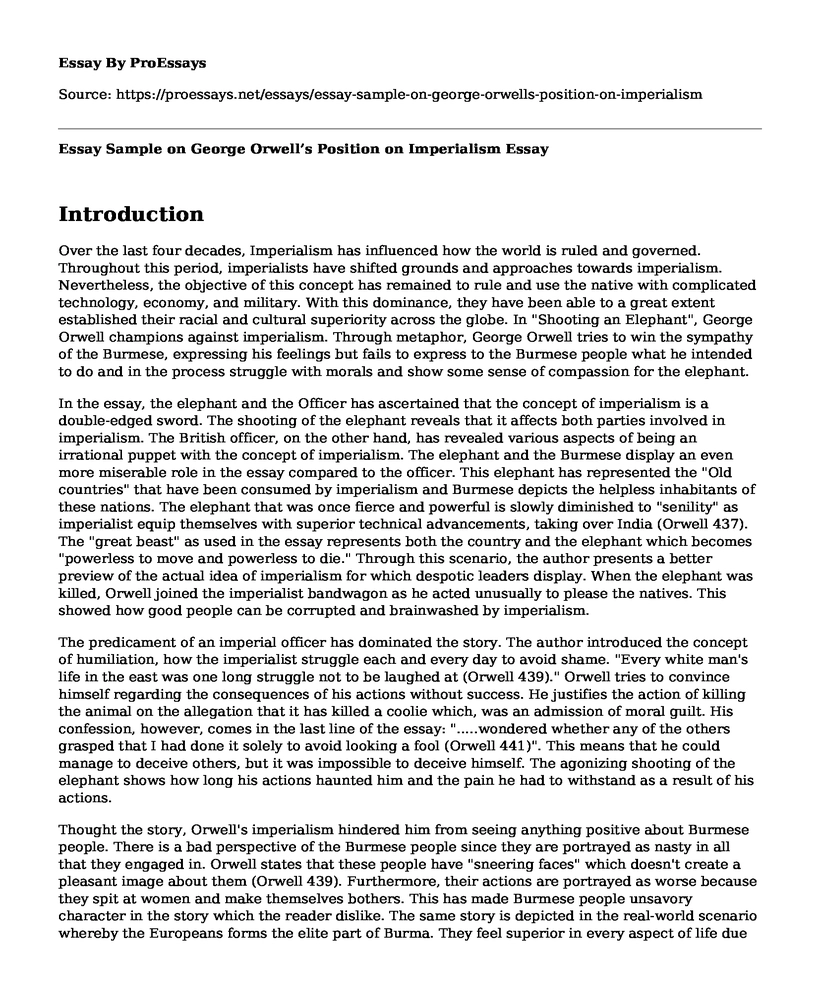Introduction
Over the last four decades, Imperialism has influenced how the world is ruled and governed. Throughout this period, imperialists have shifted grounds and approaches towards imperialism. Nevertheless, the objective of this concept has remained to rule and use the native with complicated technology, economy, and military. With this dominance, they have been able to a great extent established their racial and cultural superiority across the globe. In "Shooting an Elephant", George Orwell champions against imperialism. Through metaphor, George Orwell tries to win the sympathy of the Burmese, expressing his feelings but fails to express to the Burmese people what he intended to do and in the process struggle with morals and show some sense of compassion for the elephant.
In the essay, the elephant and the Officer has ascertained that the concept of imperialism is a double-edged sword. The shooting of the elephant reveals that it affects both parties involved in imperialism. The British officer, on the other hand, has revealed various aspects of being an irrational puppet with the concept of imperialism. The elephant and the Burmese display an even more miserable role in the essay compared to the officer. This elephant has represented the "Old countries" that have been consumed by imperialism and Burmese depicts the helpless inhabitants of these nations. The elephant that was once fierce and powerful is slowly diminished to "senility" as imperialist equip themselves with superior technical advancements, taking over India (Orwell 437). The "great beast" as used in the essay represents both the country and the elephant which becomes "powerless to move and powerless to die." Through this scenario, the author presents a better preview of the actual idea of imperialism for which despotic leaders display. When the elephant was killed, Orwell joined the imperialist bandwagon as he acted unusually to please the natives. This showed how good people can be corrupted and brainwashed by imperialism.
The predicament of an imperial officer has dominated the story. The author introduced the concept of humiliation, how the imperialist struggle each and every day to avoid shame. "Every white man's life in the east was one long struggle not to be laughed at (Orwell 439)." Orwell tries to convince himself regarding the consequences of his actions without success. He justifies the action of killing the animal on the allegation that it has killed a coolie which, was an admission of moral guilt. His confession, however, comes in the last line of the essay: ".....wondered whether any of the others grasped that I had done it solely to avoid looking a fool (Orwell 441)". This means that he could manage to deceive others, but it was impossible to deceive himself. The agonizing shooting of the elephant shows how long his actions haunted him and the pain he had to withstand as a result of his actions.
Thought the story, Orwell's imperialism hindered him from seeing anything positive about Burmese people. There is a bad perspective of the Burmese people since they are portrayed as nasty in all that they engaged in. Orwell states that these people have "sneering faces" which doesn't create a pleasant image about them (Orwell 439). Furthermore, their actions are portrayed as worse because they spit at women and make themselves bothers. This has made Burmese people unsavory character in the story which the reader dislike. The same story is depicted in the real-world scenario whereby the Europeans forms the elite part of Burma. They feel superior in every aspect of life due to the fact that they are Europeans and more educated. This also represents the dilemma that exists among the imperialist.
Conclusion
In a nutshell, George Orwell's position on imperialism can be understood in relation to existentialism contrasts of the Self and the other. The Self is given supreme importance while marginalizing and undermining the other. The author has expressed conflicting views on imperialism by giving examples of oppression by the Burmese, his morals and by his country.
Work Cited
Orwell, George. "Shooting an elephant." New Writing 2 (1936): 501-06.
Cite this page
Essay Sample on George Orwell's Position on Imperialism. (2022, Nov 17). Retrieved from https://proessays.net/essays/essay-sample-on-george-orwells-position-on-imperialism
If you are the original author of this essay and no longer wish to have it published on the ProEssays website, please click below to request its removal:
- The Warmth of Feelings: Not a Genuine Black Essay
- Symbolism in Shirley Jackson's Story 'The Lottery' Essay
- Essay Sample on Violence and Terror on the Southwest Border
- Essay Example on Efficient Community Policing: Strengthening Ties through Resources
- The Iliad: Celebrating War and Glory in the Trojan War - Essay Sample
- Paper Example on Hope's Feather: Emily Dickinson's Poem
- Essay Sample on US Military Governance







